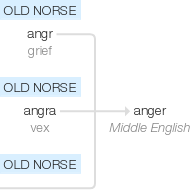Anger
Middle English: from Old Norse angr ‘grief’, angra ‘vex’. The original use was in the Old Norse senses; current senses date from late Middle English.
wiktionary
From Middle English anger(“grief, pain, trouble, affliction, vexation, sorrow, wrath”), from Old Norse angr, ǫngr(“affliction, sorrow”) (compare Old Norse ang, ǫng(“troubled”)), from Proto-Germanic *angazaz(“grief, sorrow”), from Proto-Indo-European *h₂enǵʰ-(“narrow, tied together”). Cognate with Danish anger(“regret, remorse”), Norwegian Bokmål anger(“regret, remorse”), Swedish ånger(“regret”), Icelandic angur(“trouble”), Old English ange, enge(“narrow, close, straitened, constrained, confined, vexed, troubled, sorrowful, anxious, oppressive, severe, painful, cruel”), Dutch anjer(“carnation”), German Angst(“anxiety, anguish, fear”), Latin angō(“squeeze, choke, vex”), Albanian ang(“fear, anxiety, pain, nightmare”), Avestan 𐬀𐬢𐬭𐬀 (aŋra, “destructive”), Ancient Greek ἄγχω(ánkhō, “I squeeze, strangle”), Sanskrit अंहु(aṃhu, “anxiety, distress”). Also compare with English anguish, anxious, quinsy, and perhaps to awe and ugly. The word seems to have originally meant “to choke, squeeze”. [1]
The verb is from Middle English angren, angeren, from Old Norse angra. Compare with Icelandic angra, Norwegian Nynorsk angra, Norwegian Bokmål angre, Swedish ångra, Danish angre.
etymonline
anger (v.)
c. 1200, "to irritate, annoy, provoke," from Old Norse angra "to grieve, vex, distress; to be vexed at, take offense with," from Proto-Germanic *angaz (source also of Old English enge "narrow, painful," Middle Dutch enghe, Gothic aggwus "narrow"), from PIE *anghos, suffixed form of root *angh- "tight, painfully constricted, painful."
In Middle English, also of physical pain. Meaning "excite to wrath, make angry" is from late 14c. Related: Angered; angering.
anger (n.)
mid-13c., "hostile attitude, ill will, surliness" (also "distress, suffering; anguish, agony," a sense now obsolete), from Old Norse angr "distress, grief, sorrow, affliction," from Proto-Germanic *angaz (from PIE root *angh- "tight, painfully constricted, painful"). Cognate with German Angst. Sense of "rage, wrath" is early 14c.
From the sense of oppression, or injury, the expression was transferred to the feelings of resentment naturally aroused in the mind of the person aggrieved. In the same way, the word harm signifies injury, damage in English, and resentment, anger, vexation in Swedish.
The idea of injury is very often expressed by the image of pressure, as in the word oppress, or the Fr. grever, to bear heavy on one. [Hensleigh Wedgwood, "A Dictionary of English Etymology," 1859 ]
Old Norse also had angr-gapi "rash, foolish person;" angr-lauss "free from care;" angr-lyndi "sadness, low spirits."
